Are you trying to get your projector up and running but the sound seems to be lagging behind the image? Then you’re not alone. Sound delay is a common problem with projectors, and it can be incredibly frustrating when trying to set up an immersive home theater experience. Fortunately, there are ways for you to fix sound delay on your projector by making some tweaks in the settings or with external devices. In this blog post, we’ll go over how to resolve any audio lag issues that may arise from using a projector so that you can enjoy high-quality entertainment without any interruptions.
How Does the Projector Work?
Projectors are invaluable tools for modern presentations. They allow us to project images, videos, and documents onto a large screen for everyone in the room to see. But how do these devices actually work? [1]
The primary component of any projector is its light source. This can be either an incandescent bulb or more recently, a laser diode. The light source is situated in front of a spinning wheel, which contains the red, green, and blue color filters. The colors mix together to create the projected image.
The projector is equipped with a set of mirrors and shutters. These move back and forth very quickly in order to create the desired image on the screen.
The final component of the projector is the display itself. This type of device typically uses either an LCD or a DLP chipset to create its images. Each one works in slightly different ways, but both are capable of producing vibrant and sharp pictures onscreen.
Modern projectors are highly versatile pieces of kit, capable of projecting just about anything onto a large screen. They are an invaluable tool for both business and entertainment purposes, allowing us to share our ideas with a large audience with ease. [2]
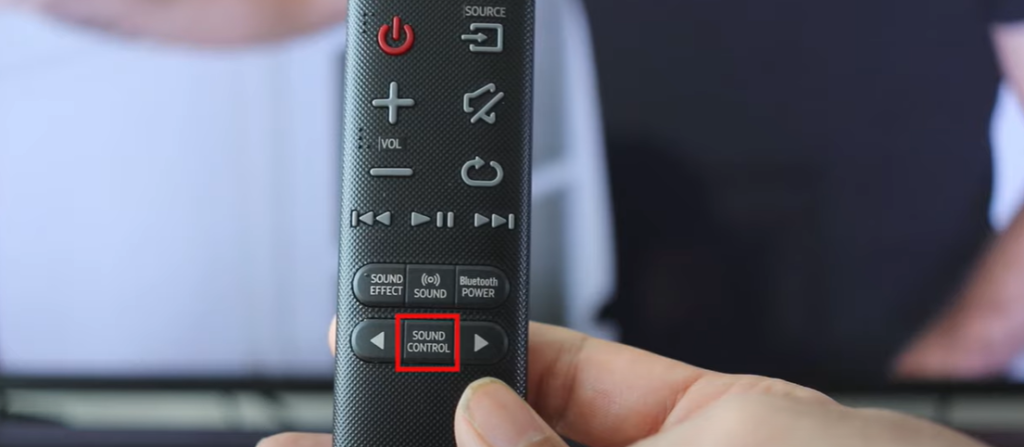
What to Watch on the Projector?
Are you looking for an exciting movie night? Watching a movie on the projector is the perfect solution for any gathering! Whether it’s friends or family, there are plenty of movies that are sure to please. Here is a list of some of our favorite films to watch on the projector:
- Forrest Gump: This classic film is the perfect choice for a projector movie night! Tom Hanks stars in this Academy Award-winning drama about an ordinary man who leads an extraordinary life. [3]
- The Lion King: Disney’s beloved animated musical, The Lion King, is sure to delight viewers of all ages. From Simba’s journey to reclaim his pride lands, to the heartwarming songs like “Hakuna Matata” and “Can You Feel the Love Tonight,” this is a must-see for any movie night!
- The Godfather: Francis Ford Coppola’s classic gangster saga about the Corleone crime family is an iconic masterpiece. From its gripping plotline, to its unforgettable characters, this movie is a timeless classic.
- Back to the Future: Michael J. Fox stars in this beloved science-fiction comedy about time travel. With exciting special effects and plenty of laughs, it’s sure to be a hit with your friends and family!
- Star Wars: A New Hope: The original 1977 space opera that started it all is a must-watch for any movie night. With its iconic characters, thrilling action sequences, and heartfelt themes, this classic film will transport viewers into a galaxy far, far away.
So grab your popcorn and get ready to enjoy the show! Whether it’s one of these classics or something else entirely, watching a movie on the projector is sure to be an unforgettable experience. Enjoy the show! [4]
How to Customize the Projector?
Customizing the projector can help create a better experience for you and your audience. It’s important to learn how to make the most out of your projector, so that it is tailored to fit your needs. Here are some tips for customizing your projector:
- Adjust the Focus: It is important to set the focus correctly on your projector in order for the image to be clear and sharp. If you’re having trouble getting the focus right, use the projector’s adjustment wheel or remote control to find the perfect balance.
- Adjust the Color Settings: Depending on your audience and environment, making minor adjustments to color settings can create a better viewing experience for everyone. Take some time to play around with different levels of brightness, contrast and saturation until the colors look just right.
- Choose the Right Projection Modes: There are several different projection modes available on your projector, such as standard, widescreen and CinemaView. Experiment with all of them to find out which one best suits your needs for any given situation.
- Maximize Your Brightness Levels: To get the best viewing experience, it’s important to maximize the brightness levels of your projector. This will help ensure that the image is as bright and clear as possible.
- Position the Projector in the Right Spot: The position of your projector can make a big difference in how it looks. Make sure to place it in a spot where there is no glare from lights or windows, and also ensure that you have the right amount of distance between the lens and the screen.
- Change Audio Settings: If you’re using sound with your projector, make sure you adjust the audio settings to fit your needs. This will ensure that everyone in the audience can hear clearly what’s happening on screen.
- Take Care of Maintenance: Finally, don’t forget about regular maintenance for your projector! Over time it can start to get dirty or suffer from wear and tear, so make sure you clean it out regularly and check for any issues. This will help keep your projector in top shape and make sure it looks great for years to come. [5]
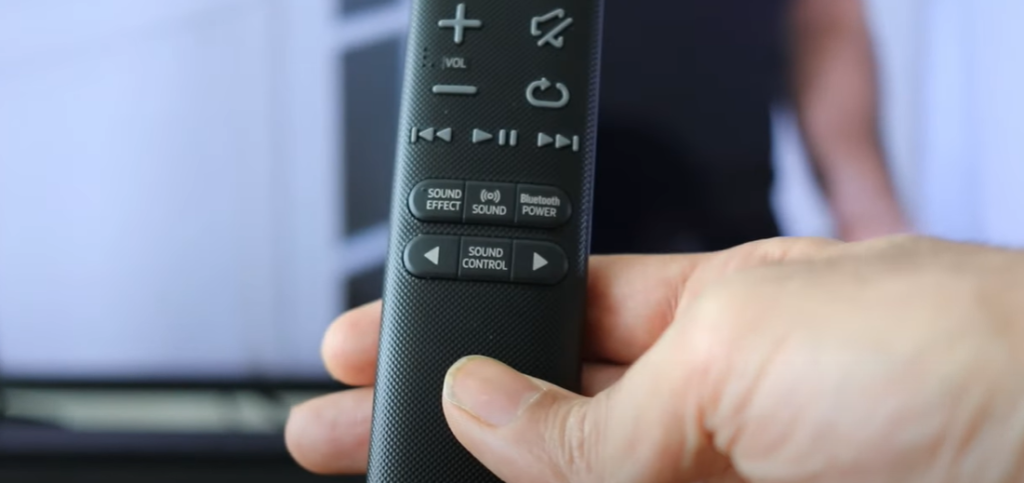
What Problems Can Happen with the Projector?
Projectors are incredibly useful tools, but there can be issues that arise if they’re not managed properly. Some of the most common problems with projectors include overheating, dust accumulation and connection issues.
Overheating
Due to their complex internal components, projectors can overheat when used continuously for extended periods of time. This is especially true if the projector is used in an area that has poor ventilation. To combat this, it is important to make sure that the projector is given adequate breathing room and that it’s running at optimal temperatures. A good way to avoid this issue is to take regular breaks between movies or presentations.
Dust Accumulation
Dust accumulation can be a major issue for projectors, as a buildup of dust can significantly reduce the image quality. To prevent this problem from occurring, it is important to clean the projector lens regularly and change any filters that have been installed in the projector.
Connection Issues
Having trouble connecting to your projector? This could be caused by a number of issues ranging from poor wiring to a bad connection. It’s important to first check all of the cables and connections before troubleshooting further. If it still isn’t working, you may need to contact your local technical support team for assistance. [6]
What is Sound Delay on the Projector?
Projectors are necessary components in many classrooms, boardrooms, and other spaces. They allow people to project images and videos onto larger surfaces, making presentations more impactful. But sometimes the sound of these projections can be delayed or off-sync with the visuals. This is known as sound delay on a projector.
Sound delay occurs when there is a discrepancy between the time it takes for sound to travel from a projector’s speakers and the time it takes for visual images to appear on the screen. This can cause audio to lag behind visuals, resulting in an out-of-sync experience. Tackling the issue of sound delay is important in order to ensure that projector users have a seamless experience. [7]
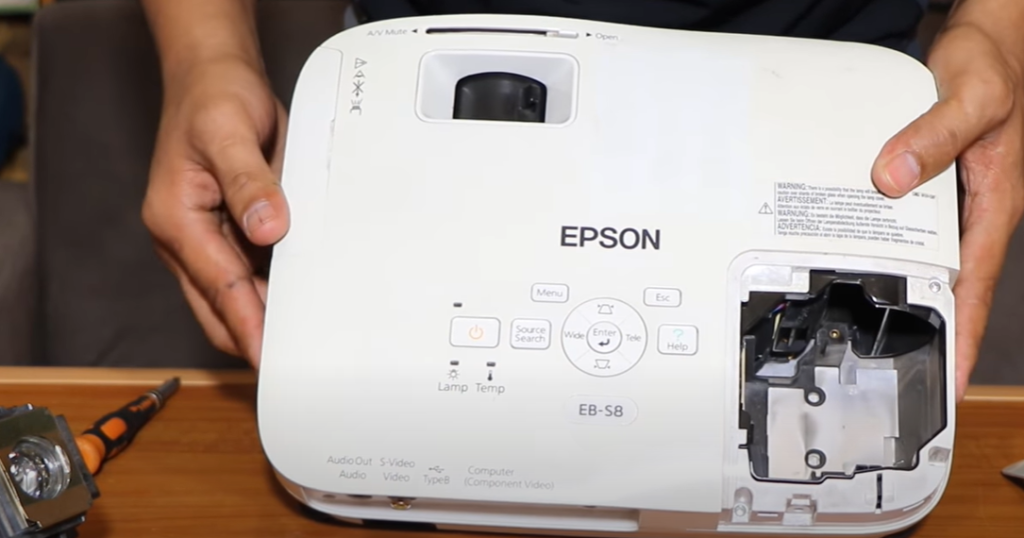
How To Fix Sound Delay On Projector: Causes and Solutions
If you have a projector with sound that is delayed, understanding the possible causes and solutions is essential for correcting the issue. There are several potential causes for a delay in your projector’s audio output, and addressing these can help ensure that you get the most out of your system.
Possible Causes
- Audio Input Settings: One of the most common causes of sound delay is incorrect audio input settings. For example, if your projector’s audio output is set to a lower sampling rate than the source device, you may experience delays in sound.
- Cable Length and Quality: The length and quality of cables connecting your system can also have an effect on sound delay. Longer cables can cause signal degradation, resulting in sound delays and other audio issues.
- Faulty Equipment: In some cases, a faulty component – such as an amplifier or speaker – can be the source of the problem. If you suspect that this is the case, it’s important to replace or repair any equipment that may be contributing to the issue.
Solutions
- Check and Adjust Audio Settings: The first step in troubleshooting sound delay is to check your projector’s audio output settings and make sure they are properly configured. If necessary, adjust the sampling rate to match the source device.
- Replace or Upgrade Cables: To ensure maximum performance from your system, you should also consider replacing or upgrading any cables that are too long or otherwise compromised. This can help reduce signal degradation and minimize delays in sound.
- Replace Faulty Equipment: If faulty equipment is the source of the problem, it should be replaced or repaired as soon as possible to ensure optimal performance from your projector system. [8]
How to Maintain the Projector?
Proper maintenance of a projector is essential for ensuring it works properly and providing optimal performance. Now, you’ll learn how to take care of your projector with the following easy steps:
Cleaning the Lens and Filter
The lens and filter of the projector should be cleaned regularly to ensure proper image quality. First, turn off and unplug the projector before cleaning. Use a soft, lint-free cloth to wipe away any dust from the lens and filter. Avoid using solvents or cleaning agents as these could damage the delicate components of your projector.
Checking Bulbs, Cables, and Connectors
It’s important to check on the bulbs, cables, and connectors of your projector regularly. If you notice any wear or tear to the projector’s components, make sure to replace them or get them repaired as soon as possible.
Spacing of Projector
Make sure you place your projector in a well-ventilated space so it can dissipate heat properly. Keep the projector away from any direct sunlight or sources of heat to avoid damage and overheating.
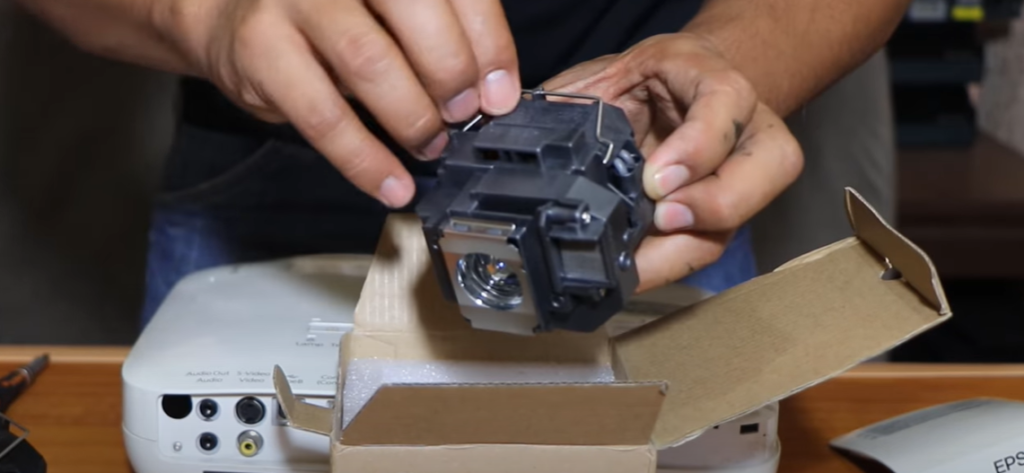
Cooling Fans
Your projector should have cooling fans that will keep the projector from overheating. In order to keep these fans working properly, you’ll need to dust and clean the fan blades periodically. Avoid using any cleaning agents on the blades as this could cause further damage.
Dusting
Regularly dusting the projector will help ensure that it continues to function properly. Use a soft duster or cloth to wipe away any debris from the device. Avoid using any chemical cleaning products on your projector as this could cause damage.
Projector Settings
Projector settings can help you optimize your picture quality and get the most from your projector. Try adjusting brightness, contrast, and other settings to make sure the projected image looks its best.
Storage Solutions
To protect your projector from damage, consider investing in a storage solution. These can include cases and covers that offer additional protection during transportation or when the projector is not in use. [9]
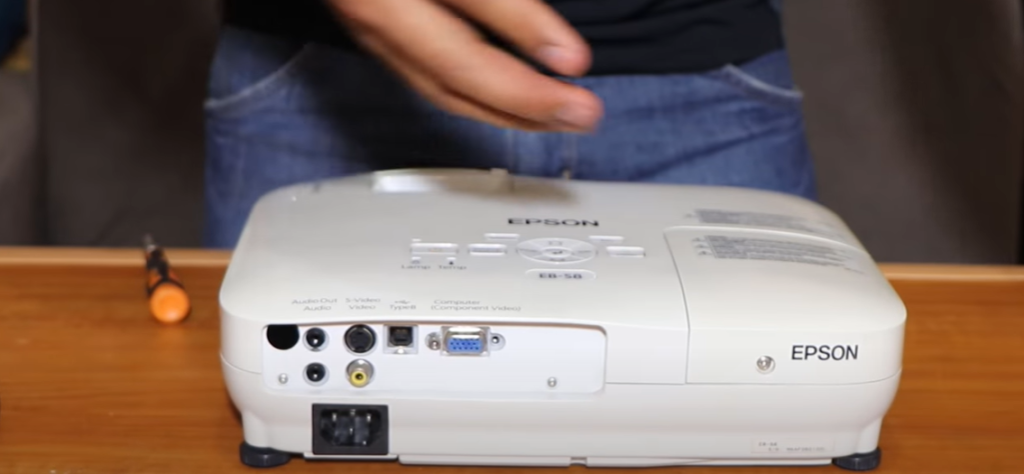
FAQs
Why is the sound delayed on my projector?
The sound may be delayed if the projector is not set up correctly. Check that the video signal and audio inputs are connected properly, and try adjusting some of your projector settings to improve your viewing experience.
Most projectors have a feature called “Audio Sync” which helps to fix any audio delay issues. To adjust the Audio Sync, you should go into your projector’s menu settings and look for the “Audio Sync” option. From there, you can adjust the timing of the sound to match with the video output.
How do I get rid of audio delay?
If you’re experiencing audio lag or delay when using a projector, the best way to fix it is to pair the projector with an external audio device. This allows for faster transmission of the sound data from the projector to the speakers, resulting in better sound quality and less lag. You can also try adjusting your display settings on the projector itself — decreasing resolution may help reduce latency. Additionally, you may want to check the cables connecting your projector and audio device to ensure they are properly fastened. With these steps, you should be able to enjoy a lag-free audio experience.
How do I reduce display delay?
Delaying the display of your projector can be a frustrating experience. Fortunately, there are some steps you can take to reduce delay and make your viewing experience more enjoyable.
First, you should check your cables to make sure they are securely fastened in place and free from any kinks or knots. A loose connection is a common cause of delays. You should also check the compatibility of your cables with your projector.
Second, you can try adjusting your projector’s settings to reduce input lag. If you have access to a user manual or online guide, consult it for instructions on how to adjust the settings for optimal display speed and delay.
Third, make sure that your video processor is up-to-date. If it’s not, then you can download the latest version from your projector manufacturer’s website.
Finally, ensure that there are no obstructions blocking the signal between your projector and the source device. Move any nearby furniture or objects so that they don’t interfere with the connection.
Do projectors have delays?
Projectors are capable of displaying content with very minimal delays. This is because they use technologies such as LCD, DLP and LED to produce images quickly. Modern projectors have sophisticated algorithms that enable them to display images directly from a source device without any noticeable lag or delay. This makes them ideal for applications where real-time response is critical, such as gaming, video conferencing, or presenting.
In order to get the most out of a projector, you should make sure that your graphics card can handle the refresh rate required for smooth visuals. Additionally, it’s important to place your projector in close proximity to any source device to reduce signal degradation and ensure an optimal viewing experience.
Useful Video: What is Input Lag? And how to avoid it? All you need to know
Final Thoughts
The issue of sound delay on projectors is a common one for many people and can be a source of frustration. However, when faced with this problem it is possible to overcome it by using the methods outlined in this blog post. If these tips do not resolve your issue, then you should consider contacting a professional or taking your projector to an authorized service center for more experienced assistance. In any case, if at first you don’t succeed, simply follow the steps outlined and use the tools provided. With patience and the right approach, you may soon find yourself watching movies without the annoying sound delay. So don’t let a light struggle turn into an epic battle – just grab your remote control and press play on fixing that sound delay! Have fun watching all those perfect movies without any hassle or distortions!
References:
- https://www.makeuseof.com/how-does-a-projector-work/
- https://www.projectorpoint.co.uk/blog/how-do-projectors-work
- https://www.theprojectorexpert.com/movies-to-stream-with-projector/
- https://pointerclicker.com/best-movies-to-watch-on-a-projector/
- https://rankprojectors.com/how-to-adjust-projector-screen-size/
- https://www.k12techrepairs.com/5-tips-to-fix-common-projector-issues/
- https://pointerclicker.com/how-to-fix-sound-delay-on-projector/
- https://ivankyo.com/blogs/tech/best-solutions-for-home-projector-common-sound-issues
- https://projectorninja.com/here-are-12-helpful-projector-care-and-maintenance-tips-to-keep-in-mind/




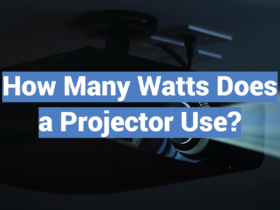
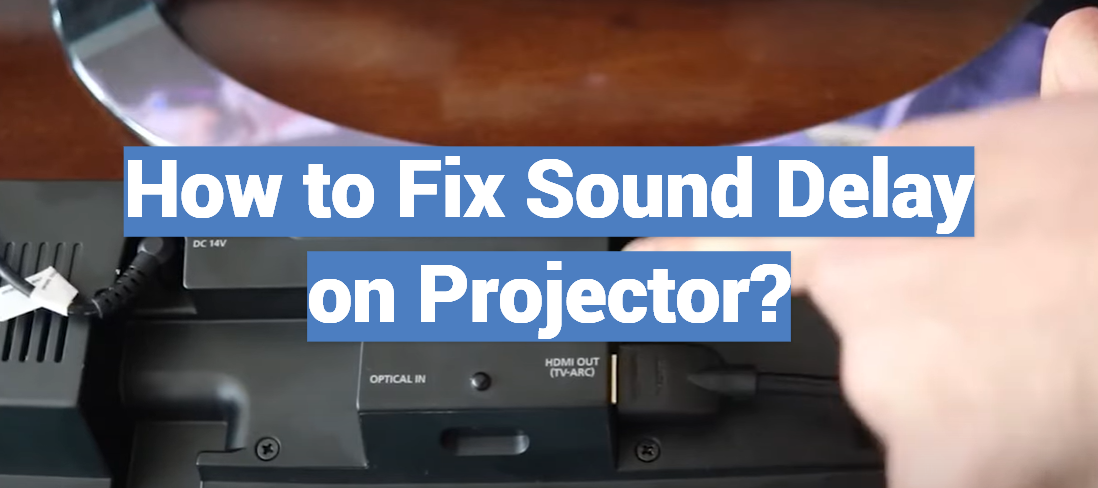
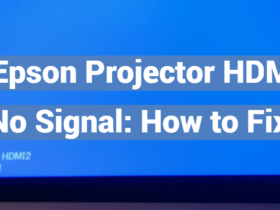
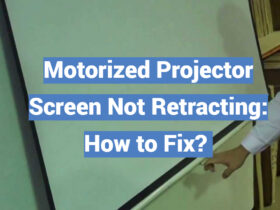
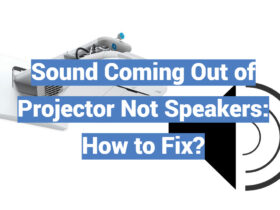
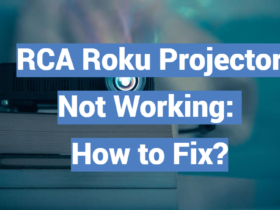
Leave a Review